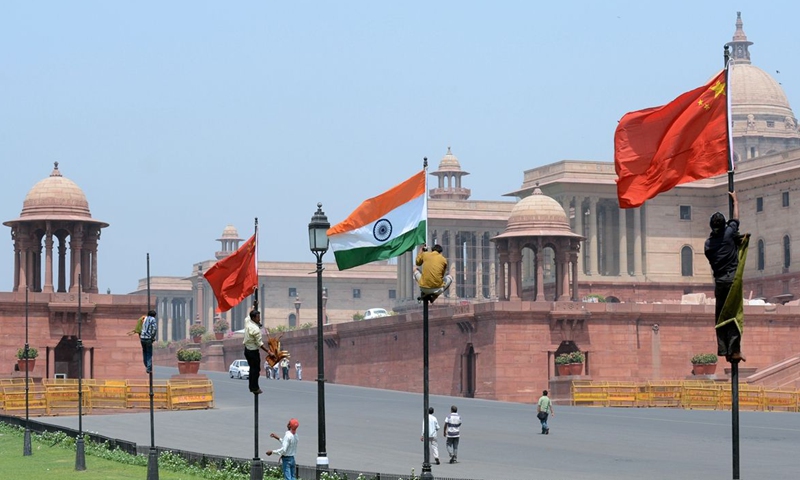Will new China-India border peace deal hold?
Source: Global Times Published: 2020/7/7 21:23:40

China India Photo:AFP
Editor's Note:
Chinese Special Representative of the China-India Boundary Question, State Councilor and Foreign Minister Wang Yi and Indian National Security Advisor Ajit Doval spoke over phone Sunday night. The two sides reached a consensus on de-escalating border tensions. Will the consensus help ease bilateral border matters? How will India's rising nationalism affect the two countries' relations? Global Times reporters talked to two Chinese experts on these issues.
Song Zhongping, a military expert and TV commentator
China's military capabilities, including its joint combat capabilities and logistics support capabilities, are generally superior to India's.
Therefore, if crossfire occurs, the Chinese People's Liberation Army can defeat the Indian army. However, crossfire is a lose-lose situation for both countries.
The two sides' consensus on de-escalating border tensions shows that they have agreed to take a step back and take care of the overall situation. However, taking a step back does not represent a weak concession on the part of China - it is for the consideration of the big picture. China has always hoped for friendly relations with its neighbors. Hopefully India can also treat the two sides' disputes with greater tolerance.
Nationalism continues to rise in India. Since its independence, India has always wanted to develop its military power, even though there are still many poor people in the country. Due to such sentiments, blind confidence in the military is spreading in India as certain countries from both the East and the West have tried to woo India and provided it with various weapons. But this is limited to selling weapons, not technology transfer. These gestures won't help India improve its military capabilities.
Some forces in India have long wanted to boycott "Made in China" products, but they had no excuses. Thus, they are taking advantage of the tensions on the border, hyping the "China threat" theory and boycotting Chinese products. These are important signs of India's nationalism. These forces are trying to revitalize India's military and economy in this way. But they are way too confident. As is apparent, India has neither enough military and industrial capabilities, nor does it have the ability to actually confront China.
The two sides have reached a consensus this time. China-India relations will cool down, especially military relations. However, mutual trust in border control has already declined. Indian troops believe that they have suffered losses in the Galwan Valley. If this sentiment remains for a long time, China-India military relations may become tense again.
India is constantly purchasing various weapons and strengthening the construction of military facilities along its border. Indeed, India regards China as its biggest imaginary enemy. Combined, these stand to harm mutual trust between the militaries of India and China. Hopefully, India can meet China halfway after this important border consensus was reached.
Lan Jianxue, deputy director of the Department for Asia-Pacific Studies at the China Institute of International Studies
This communication will help prevent tensions from further escalating.
China and India have held talks through military and diplomatic channels for several times. Yet it still remains to be seen whether bilateral border tensions will be mitigated. Currently, there is no evident sign that the situation has abated.
Furthermore, there is strong anti-China sentiment and loud voices calling for boycotting Chinese products in India. This has gravely impaired the cooperative atmosphere between the two countries. New Delhi has made efforts to expand its divergence with Beijing. It has upgraded border confrontations and is now trying to antagonizing other dimensions of bilateral relations. This works as a block to ease the tense border disputes.
India, which began this round of border clashes, should lead its public opinion toward a positive direction for peaceful solutions to the border confrontation. New Delhi has to take the responsibility not to further inflame the matter and upset the overall China-India ties.
In face of the strong anti-China sentiment and activities in India, China should remain calm and determined. India has a choice to peacefully coexist or confront its neighbors including China. Instead of launching a war of words with India, China should continue to clarify what is right and wrong and make clear to the international community that tensions were initiated by India. China should also agree to total de-escalation for peace and tranquility along the LAC. In the meantime, China has to stay vigilant and prepare for the potential reckless attacks from the Indian side, especially after reports that India has changed its rules of engagement in the border area.
At present, it is up to New Delhi to decide if tensions will rise or cool down. It is also expected that India can make a rational and correct choice. As Indian Prime Minister Narendra Modi said in an interview with Hindustan Times in April 2018, "there have been occasional incidents in the border areas due to differing perceptions about the Line of Actual Control. However, both countries have always managed to resolve these incidents through dialogue on the ground as well as through diplomatic channels... This shows that India and China are both mature countries, capable of peacefully resolving our differences."
It is hoped that India will abide by that statement.
Posted in: VIEWPOINT